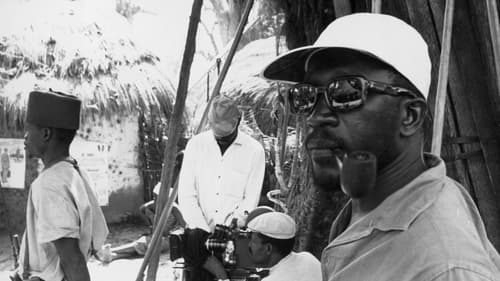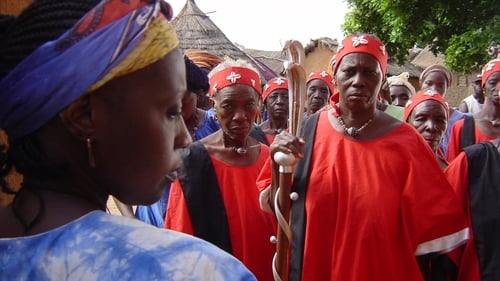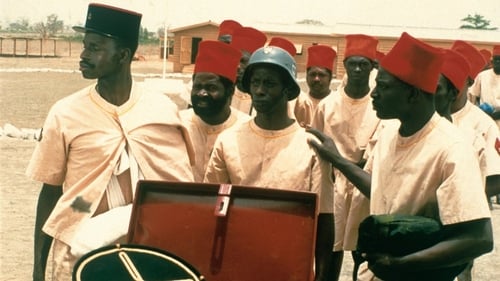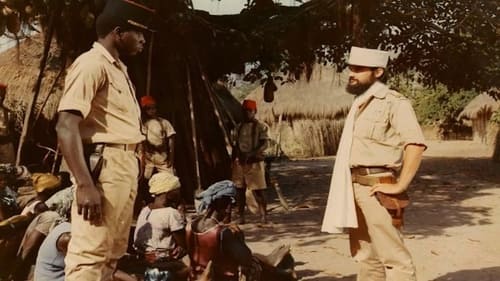Ousmane Sembène
출생 : 1923-01-01, Ziguinchor, Casamance, Senegal
사망 : 2007-06-09
약력
Ousmane Sembène (January 1, 1923 — June 9, 2007), often credited in the French style as Sembène Ousmane in articles and reference works, was a Senegalese film director, producer and writer. The Los Angeles Times considered him one of the greatest authors of Africa and he has often been called the "Father of African film."

Himself (archive footage)
Meet Ousmane Sembene, the African freedom fighter who used stories as his weapon.

Self
Portrait of Tahar Chériaa. Founder of the first african cinefestival and father of panafricanism.

The film uses a collection of post-World War II black & white photographs to portray the dockworkers of Marseilles, many of whom were of African descent. Set in and around a 1947 strike protesting weapons shipments to the French in Indochina, the images evoke the life and work of Senegalese filmmaker, Ousmane Sembène, a former dockworker, and one of the founding figures of the New African Cinema of the 1960s.

Producer
When a woman shelters a group of girls from suffering female genital mutilation, she starts a conflict that tears her village apart.

Writer
When a woman shelters a group of girls from suffering female genital mutilation, she starts a conflict that tears her village apart.

Director
When a woman shelters a group of girls from suffering female genital mutilation, she starts a conflict that tears her village apart.

Writer
A forty-year-old woman refuses to give into the stigma of unwed motherhood and climbs the ladder of success in a male dominated field.

Director
A forty-year-old woman refuses to give into the stigma of unwed motherhood and climbs the ladder of success in a male dominated field.

Senegalese documentary about the country's most famous film-maker - Ousmane Sembène. The groundbreaking director explains his philosophy, politics and hopes for the future of African cinema.

Producer
Burial of a Christian political activist in a Muslim cemetary forces a conflict imbued with religious fervor.

Writer
Burial of a Christian political activist in a Muslim cemetary forces a conflict imbued with religious fervor.

Director
Burial of a Christian political activist in a Muslim cemetary forces a conflict imbued with religious fervor.

Screenplay
A Senegalese platoon of soldiers from the French Free Army are returned from combat in France and held for a temporary time in a military encampment with barbed wire fences and guard towers in the desert. Among their numbers are Sergeant Diatta, the charismatic leader of the troop who was educated in Paris and has a French wife and child, and Pays, a Senegalese soldier left in a state of shock from the war and concentration camps and who can only speak in guttural screams and grunts.

Director
A Senegalese platoon of soldiers from the French Free Army are returned from combat in France and held for a temporary time in a military encampment with barbed wire fences and guard towers in the desert. Among their numbers are Sergeant Diatta, the charismatic leader of the troop who was educated in Paris and has a French wife and child, and Pays, a Senegalese soldier left in a state of shock from the war and concentration camps and who can only speak in guttural screams and grunts.

Himself
Paulin Vieyra captures Ousmane Sembène, one of the greatest filmmakers of Africa, during the filming of Ceddo. L’Envers du Decor was completed after four years of production. As for Ceddo, it would be censored under the Senghor regime and until 1983 by the Senegalese authorities.

Writer
When King Demba War sides with the Muslims, the Ceddo kidnap his daughter, Princess Dior Yacine, to protest their forcible conversion to Islam.

Ibrahima
When King Demba War sides with the Muslims, the Ceddo kidnap his daughter, Princess Dior Yacine, to protest their forcible conversion to Islam.

Director
When King Demba War sides with the Muslims, the Ceddo kidnap his daughter, Princess Dior Yacine, to protest their forcible conversion to Islam.

Writer
It is the dawn of Senegal's independence from France, but as the citizens celebrate in the streets we soon become aware that only the faces have changed. White money still controls the government. One official, Aboucader Beye, known by the title "El Hadji," takes advantage of some of that money to marry his third wife, to the sorrow and chagrin of his first two wives and the resentment of his nationalist daughter. But he discovers on his wedding night that he has been struck with a "xala," a curse of impotence. El Hadji goes to comic lengths to find the cause and remove the xala, resulting in a scathing satirical ending.

Director
It is the dawn of Senegal's independence from France, but as the citizens celebrate in the streets we soon become aware that only the faces have changed. White money still controls the government. One official, Aboucader Beye, known by the title "El Hadji," takes advantage of some of that money to marry his third wife, to the sorrow and chagrin of his first two wives and the resentment of his nationalist daughter. But he discovers on his wedding night that he has been struck with a "xala," a curse of impotence. El Hadji goes to comic lengths to find the cause and remove the xala, resulting in a scathing satirical ending.

Screenplay
2차 세계대전이 한창인 1940년대, 프랑스의 식민지 세네갈은 강제징용과 공물헌납에 시달리고 있었다. 까사망스 지방의 디올라족에게도 쌀 50톤을 바치라는 명령이 내려온다. 그러나 식량조차 부족한 이들에게 공납할 쌀이 있을 턱이 없다. 군인들이 마을에 들이닥치자, 지도자 지메코는 사람들을 모아 당당히 맞선다. 아프리카시네마의 선구자인 우스만 셈벤의 숨은 걸작으로, 억압받는 아프리카 민중들의 실상과 저항을 그려낸 영화. 프랑스에 대한 비판적 묘사 때문에, 자국에서조차 5년이나 공개되지 못했다.

Director
2차 세계대전이 한창인 1940년대, 프랑스의 식민지 세네갈은 강제징용과 공물헌납에 시달리고 있었다. 까사망스 지방의 디올라족에게도 쌀 50톤을 바치라는 명령이 내려온다. 그러나 식량조차 부족한 이들에게 공납할 쌀이 있을 턱이 없다. 군인들이 마을에 들이닥치자, 지도자 지메코는 사람들을 모아 당당히 맞선다. 아프리카시네마의 선구자인 우스만 셈벤의 숨은 걸작으로, 억압받는 아프리카 민중들의 실상과 저항을 그려낸 영화. 프랑스에 대한 비판적 묘사 때문에, 자국에서조차 5년이나 공개되지 못했다.

Writer
A young unemployed man fends off accusations of laziness and makes a home for his pregnant girlfriend who has been rejected by her family.

Director
A young unemployed man fends off accusations of laziness and makes a home for his pregnant girlfriend who has been rejected by her family.

Public Writer at the Post Office (uncredited)
파리에 있는 친인척으로부터 우편환을 받게 된 한 세네갈 출신의 가장, 그로인해 그의 인생이 전환된다. 그가 상대해야 할 것들은 다음과 같다. 부패, 욕망, 문제적 가족 구성원, 이웃, 전통을 탈피한 모던한 생활로의 변화.

Writer
파리에 있는 친인척으로부터 우편환을 받게 된 한 세네갈 출신의 가장, 그로인해 그의 인생이 전환된다. 그가 상대해야 할 것들은 다음과 같다. 부패, 욕망, 문제적 가족 구성원, 이웃, 전통을 탈피한 모던한 생활로의 변화.

Director
파리에 있는 친인척으로부터 우편환을 받게 된 한 세네갈 출신의 가장, 그로인해 그의 인생이 전환된다. 그가 상대해야 할 것들은 다음과 같다. 부패, 욕망, 문제적 가족 구성원, 이웃, 전통을 탈피한 모던한 생활로의 변화.

Novel
더 나은 삶을 찾아 해외로 떠난 세네갈 여성은 차별과 소외에 시달리며 프랑스 남부의 한 가정에서 가정부로 일하게 된다.

The Teacher (uncredited)
더 나은 삶을 찾아 해외로 떠난 세네갈 여성은 차별과 소외에 시달리며 프랑스 남부의 한 가정에서 가정부로 일하게 된다.

Writer
더 나은 삶을 찾아 해외로 떠난 세네갈 여성은 차별과 소외에 시달리며 프랑스 남부의 한 가정에서 가정부로 일하게 된다.

Director
더 나은 삶을 찾아 해외로 떠난 세네갈 여성은 차별과 소외에 시달리며 프랑스 남부의 한 가정에서 가정부로 일하게 된다.

Producer
The pregnancy of a young girl scandalizes her community.

Writer
The pregnancy of a young girl scandalizes her community.

Director
The pregnancy of a young girl scandalizes her community.

Producer
A cart-taxi driver goes to the city to make a living, but out of sympathy with other poverty-stricken people, he works for free and goes hungry himself.

Writer
A cart-taxi driver goes to the city to make a living, but out of sympathy with other poverty-stricken people, he works for free and goes hungry himself.

Director
A cart-taxi driver goes to the city to make a living, but out of sympathy with other poverty-stricken people, he works for free and goes hungry himself.















